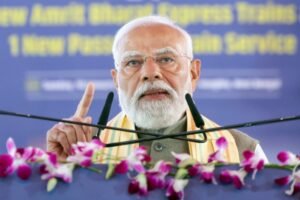
Srinagar: With the establishment of a full-time government in Jammu and Kashmir (J&K), several significant changes are expected to unfold across political, economic, and social spheres. Here’s a breakdown of the key changes:
1. Political Stability and Autonomy
- Restoration of Democracy: A full-time government in J&K would restore the democratic process that has been in a state of flux since the abrogation of Article 370 in 2019. Elections could give local political parties a stronger voice in governance.
- Local Representation: Greater political autonomy allows local issues, concerns, and aspirations to be addressed more effectively by a government that understands the ground realities.
- Integration with the Union: A stable government will focus on strengthening integration with the rest of India, bringing J&K fully into the constitutional and economic framework of the country while maintaining regional sensitivities.
2. Security and Peacebuilding
- Improved Law and Order: With a full-fledged government, there will likely be better coordination between local law enforcement and central agencies. This could lead to enhanced peace and stability in the region.
- Counter-Terrorism Efforts: A stable political environment might foster long-term strategies to counter terrorism, insurgency, and cross-border infiltration from Pakistan, aiming for sustained peace.
3. Economic Growth and Development
- Increased Investments: With political stability, investor confidence could rise, leading to a surge in investments. Focus could shift to developing infrastructure, tourism, and agriculture—key industries in the region.
- Job Creation: A full-time government can prioritize employment generation, addressing the high unemployment rate in J&K, especially among the youth.
- Boost to Tourism: With stable governance and enhanced security, tourism, which has been a backbone of the region’s economy, could see a revival, attracting more domestic and international tourists.
4. Social Reforms and Integration
- Education and Healthcare: A proactive government could focus on improving education and healthcare systems, which have suffered due to conflict. Investments in higher education and vocational training could empower the youth.
- Addressing Marginalization: A full-time government might also address the concerns of marginalized communities, such as the Gujjar and Bakarwal populations, and work on ensuring equality and development across regions, including Jammu and Ladakh.
5. Resolution of Long-Pending Issues
- Rehabilitation of Kashmiri Pandits: A stable government might prioritize the rehabilitation of displaced Kashmiri Pandits and other minorities.
- Regional Balances: Jammu, Kashmir, and Ladakh have distinct political, cultural, and economic identities. A full government would need to manage regional aspirations effectively, ensuring equitable development across all three regions.
6. Strengthening of Central and State Relations
- Better Coordination: A full-time government in J&K would improve coordination with the central government, particularly regarding development programs, security measures, and disaster management.
- Devolution of Power: Enhanced governance could ensure smoother implementation of central schemes while tailoring them to local needs.
A full-time government in J&K would likely bring increased political stability, foster economic development, enhance security, and improve the quality of life for its citizens. The region, which has been in the limelight for decades due to conflict, would have an opportunity for growth and integration into India’s broader developmental framework.











